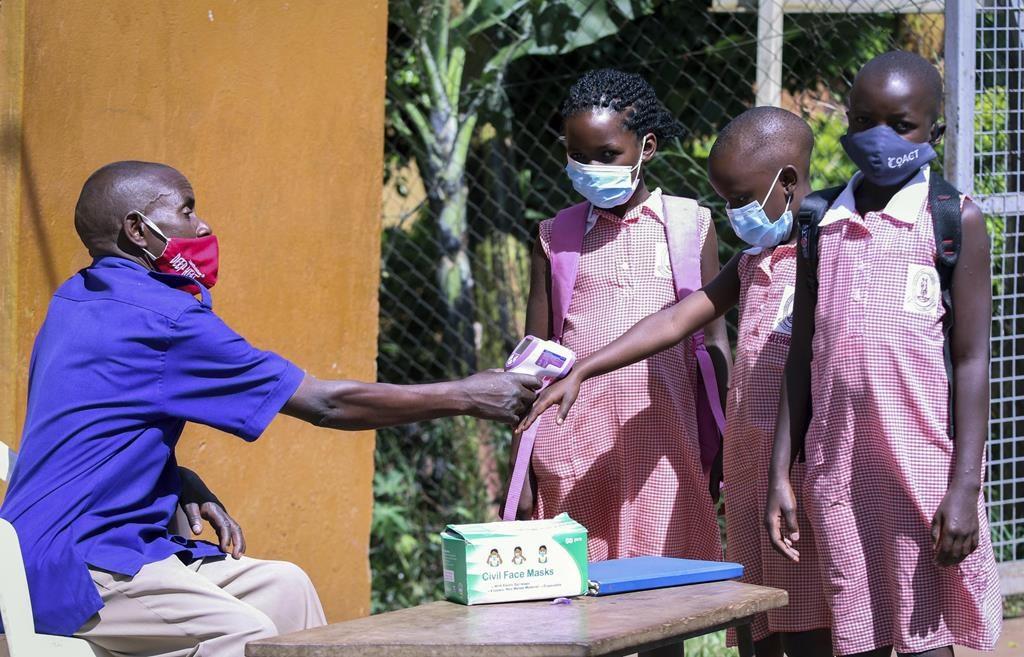World's longest COVID-19 school disruption in Uganda is coming to an end
Ugandan schools reopened to students on Monday, ending the world's longest school disruption due to the COVID-19 pandemic.
The reopening has caused traffic jams in parts of the capital, Kampala, and students can be seen carrying their mattresses through the streets, a back-to-boarding phenomenon not seen here in nearly two years.
Ugandan schools have been totally or partially closed for more than 83 weeks, the longest interruption in the world, according to figures from the United Nations cultural agency. The closure has affected more than 10 million learners.
IT'S TIME FOR CDC TO PIVOT ON COVID TESTS
Students walk around the school grounds during recess at Kitante Primary School in Kampala, Uganda, Monday, Jan. 10, 2022. (AP Photo/Hajarah Nalwadda)
The East African country of 44 million people closed its schools for the first time in March 2020, shortly after the first case of coronavirus was confirmed on the African continent. Some classes have been reopened to students in February 2021, but a full lockdown was imposed again in June as the country faced its first major wave.
For many parents, the reopening was long overdue.
"Obviously, we have to open schools," said Felix Okot, father of a 6-year-old child. "The future of our children, the future of our nation, is at stake."
Schools across the country cannot "wait forever" for the pandemic to end, he warned.

The prolonged school closure has proved controversial in a country where measures to stem the spread of the virus have been ignored by many. Skepticism about vaccines, even among health workers, remains a problem, with growing reports of fake COVID-19 vaccination cards being sold in downtown Kampala.
Many students returning to school reportedly had no help during the lockdown. Most state schools, which serve the vast majority of children in Uganda, were unable to offer virtual schooling. The Associated Press reported in November of students in a remote Ugandan town where weeds grew in classrooms and some students worked in a swamp as gold diggers.
Some critics have pointed out that the government of President Yoweri Museveni – an authoritarian who has held power for 36 years and whose wife is education minister – has done little to support home learning. Museveni justified the lockdown by insisting that infected students were a danger to their parents and others.
“There are many things that cannot be predicted at the moment. Student participation is unpredictable, teacher participation is unpredictable,” said Fagil Mandy, a former government school inspector who now works as an independent consultant. reasons, including tuition fees. »
Mandy also noted that a virus outbreak would "spread very quickly" in overcrowded schools, urging school administrators to monitor closely.
Students wear face masks as they attend classes at Kitante Primary School in Kampala, Uganda on Monday, January 10, 2022. (AP Photo/Hajarah Nalwadda)
Welcoming the reopening of Ugandan schools, Save the Children warned that "learning loss could lead to high dropout rates in the coming weeks without urgent action", including what it described as catch-up clubs .
The aid group warned in a statement on Monday of a wave of dropouts "as returning students who have fallen behind in their learning fear they have no chance of catching up".
It remains to be seen how long Ugandan schools will remain open, with an alarming increase in virus cases in recent days. Over the past week, health authorities have reported a daily positivity rate above 10%, against virtually zero in December. Museveni warned of a possible new lockdown if intensive care units reached 50% occupancy.
Hoping for a smooth return to school, authorities waived any COVID testing requirements for students An abbreviated curriculum was also approved as part of a deal to automatically promote all students in the next class.
Students walk around the school grounds during recess at Kitante Primary School in Kampala, Uganda, Monday, Jan. 10, 2022. (AP Photo/Hajarah Nalwadda)
CLICK HERE TO GET THE FOX NEWS APP
Uganda has received foreign support for the reopening of schools.
The United Nations children's agency and the governments of the United Kingdom and Ireland announced financial support focused on virus surveillance and the mental health of pupils and teachers in 40,000 schools They said that their support was essential to keep Uganda's school system open.
Codeco of December 3, 2021: the new measures target schools, masks, events, but not the horeca
GO
Sunburn: how to make up for the damage? - Miss
GO
How to Get Free N95 Masks from the US Government
GO
Beauty coaching: can I apply oil if I have oily skin?
GO